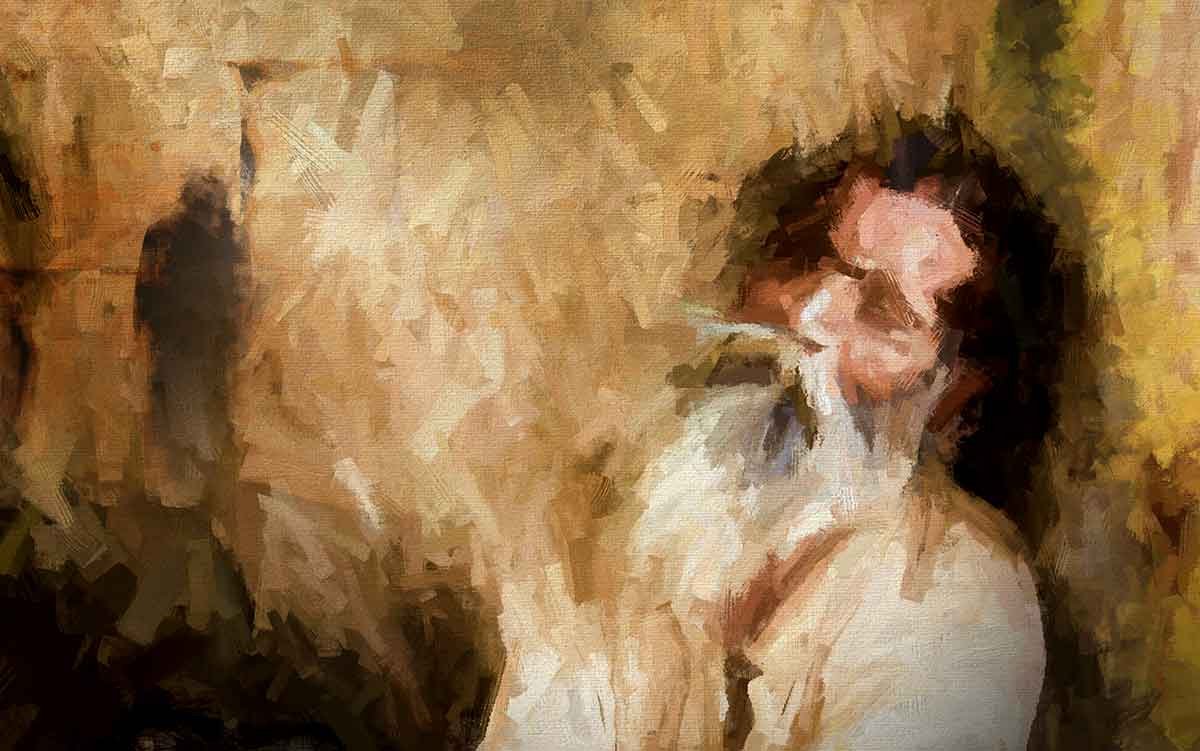Moshiach the king is also a rav who cares for every person - even outcasts, lepers. He sees the good in everyone and inspires them to take the direct path to redemption.
By Rabbi Boruch Merkur
 Artistic impression of suffering and exile. (Image © First Fruits of Zion)
Artistic impression of suffering and exile. (Image © First Fruits of Zion)
In a world vacuous of worthy leaders, a king rises to return the ancient Davidic dynasty to its glory. But unlike King David, his predecessor from antiquity, Moshiach’s rule is marked not by military triumph so much as the victory of reason over tyranny, transforming all of humanity from the inside out.
The temptation is to celebrate Moshiach, this epic hero, as a cult of personality. After all, his greatness – even in the dark times of exile – outshines the Avos and Moshe Rabbeinu.[1] But just days after charging us to complete the mission we expected the Rebbe himself to complete, to usher in the promised redemption,[2]the Rebbe again demanded personal accountability from us on this historic mission:
Although Moshiach Tzidkeinu stands ready to come immediately, he still has not arrived. A final effort is asked of each individual to make it happen. Action is required - not through Malchus b’taharasa, what the personage of Melech HaMoshiach himself represents, but - through Malchus Sh’B’Tiferes, which is the purpose of Moshiach (Malchus, Sovereignty) as expressed through Torah (Tiferes, Harmony). Moshiach in his capacity as rav, an authority in Torah, draws down the Supernal Divinity[3] of the redemption (associated with Moshiach’s role as king) in a way that transforms character.[4]
Moshiach the king is a cut above everyone else, “exceedingly lofty.” The people, his subjects, relate to him through bittul, receiving the yoke of his rule. The impact of this dynamic, however, is indirect, subconscious, makif.
As rav, Moshiach bridges his sovereignty with genuine, personal transformation, having a direct influence on the people by teaching them Torah. This direct path begins with the individual:
The appearance of Moshiach and the advent of the Messianic Era begins with each individual Jew … for each Jew possesses a spark of Moshiach’s soul (Maor Einayim Pinchas, end).[5]
Expressing his exceptional humility, teaching Torah to all walks of life, Moshiach connects directly with each individual. He inspires each person to assume the throne in their own sphere of influence, dedicating their personal kingdoms to Torah, G-d’s will and wisdom.
*
Moshiach is called Metzora,[6] a leper mummified with bandages. What a peculiar accolade for such a great king.
But this name is meant to express his care for the people, reaching out to them to teach them and kindle their transformation. In commiseration with his people, Moshiach suffers their illnesses - “he sits among the poor, sufferers of ailments.”[7]Being a sensitive, compassionate teacher, their personal affliction is Moshiach’s contagion.
The greatness of Moshiach the Leper is his self-sacrificial exposure to the people. What is difficult to understand though is that the sufferers he dwells among and consoles are afflicted with leprosy primarily because of lashon ha’ra, inappropriate talk about others. Through the supernatural affliction of leprosy, Hashem calls out these people as lepers, outcasts, pariahs. Yet the Leper King seeks out and suffers their company, because he is authentic enough to inspire their transformation:
The reason Moshiach is called Leper of the House of Rebbi is because “the sign of leprosy called ‘baheres’ is bright like snow … Although it appears as an affliction, it is the counterpart of Oneg HaElyon, Supernal Delight – ‘His garment was like white snow.’ Moshiach brings to light the core Supernal pleasure. He suffers the nega, the affliction, in order that his vicarious suffering draws down ha’oneg k’slag chivar, pleasure ‘like white snow.’”[8]
The lepers are purified by this noble teacher, a rav who cares for every person, and sees good in everyone. Seeing the good at the core of our afflictions is the key to realizing their incredibly lofty source.
We all have a spark of compassion and humanity within us, empowering us to pave a direct path, bridging the greatest heights of Divine Sovereignty with our most basic human interactions. In this way, we reveal the good even in suffering, unveiling a dwelling for G-d in every corner of the world.
NOTES:
[1] Tanchuma Toldos 14
[2] Seifer HaSichos 5751, pg. 474.
[3] “Oros Elyonim” in the original.
[4] “B’ofen p’nimi” in the original. Seifer HaSichos 5751, pg. 501.
[5] Seifer HaSichos 5751, pg. 497, FN 74.
[6] Sanhedrin 98b.
[7] Sanhedrin 98a.
[8] Ohr HaTorah Nach, pg. 93. Seifer HaSichos 5751, pg. 496, FN 65.